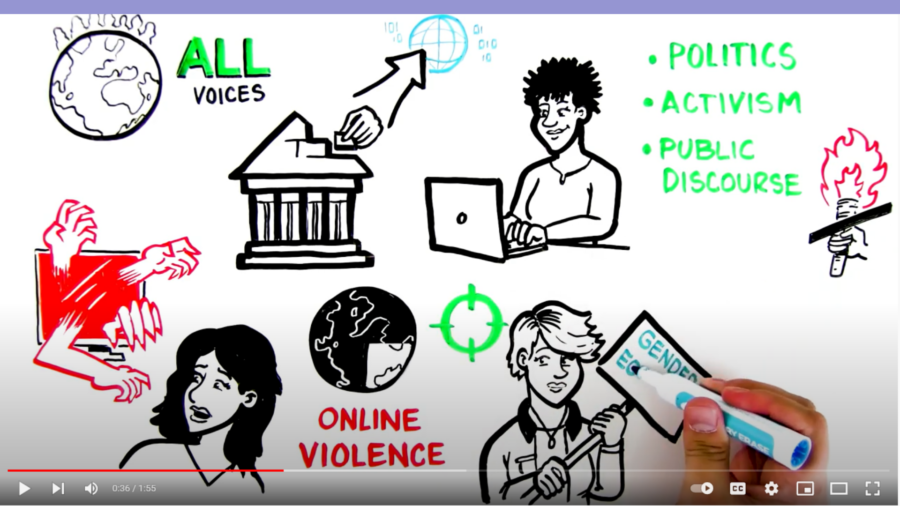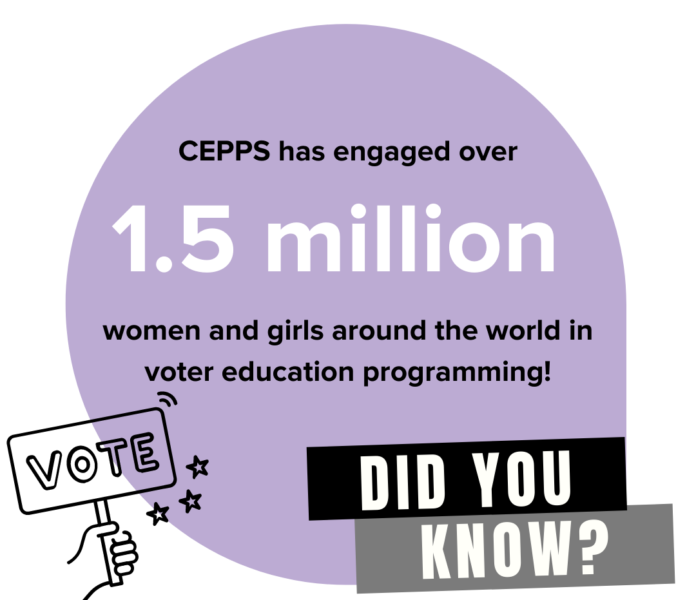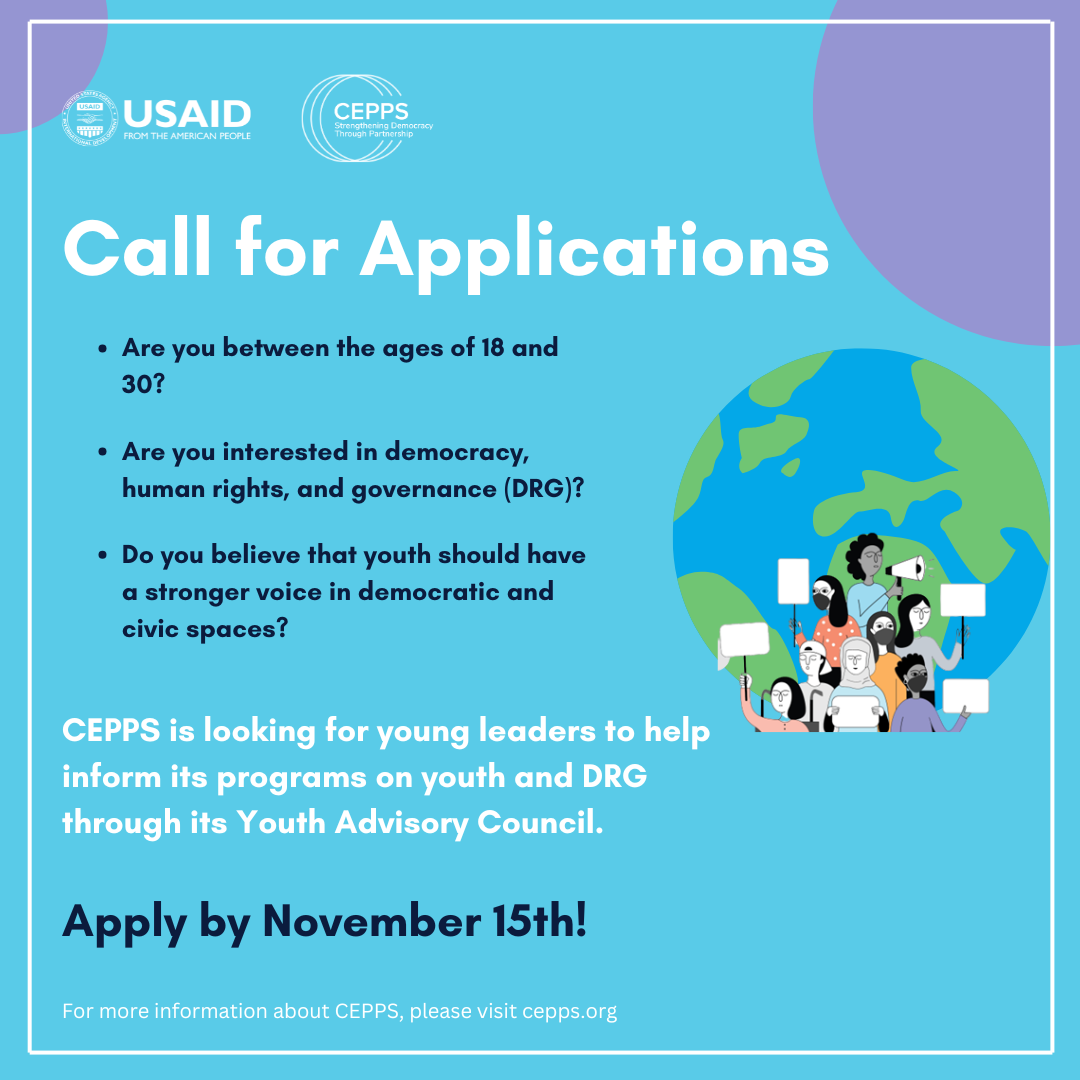To read this issue in its original format, click here.
Dear Colleagues,
The past few weeks have been challenging on so many levels. We have watched in horror as Russia violates the territorial integrity of a sovereign, neighboring country, and witnessed the increasing devastation and loss of life brought on by war.
In response to Russia’s military assault on Ukraine, the Consortium for Elections and Political Process Strengthening (CEPPS) denounced the invasion in a statement and stands in solidarity with the Ukrainian people and their right to a free and democratic country. Since 2001, CEPPS has partnered with, and supported Ukrainian democracy advocates in their efforts to strengthen and safeguard the development of their country’s democratic institutions, norms, and values. In this dark period, CEPPS remains resolute in support of our partners, and all Ukrainians as they fight for their lives and rights.
As CEPPS and the global community mark International Women’s Day (IWD), we are reminded more than ever of the importance of women’s full and equitable participation in democratic governance, security, and peacebuilding in Ukraine and around the globe. Women suffer disproportionate effects of armed conflict, including sexual and gender-based violence. In Ukraine, we see women of all types suffering – including widows, elderly women, women with disabilities, pregnant women, racial minorities, and LGBTQI+ people – especially as their access to medical care, clean water and food has become more difficult to reach as the violence has intensified.
At the same time, however, we see resilient, politically engaged women in Ukraine and all over the world, leading resistance efforts and standing up to democratic threats. To that end, we look forward to celebrating IWD. The theme of this year’s global IWD campaign, “Gender Equality Today for a Sustainable Tomorrow”, recognizes the contributions made by women and girls around the world who lead the charge on climate change and respond to the call of building a more sustainable future for all. As the impacts of climate change increasingly affect people’s ability to meaningfully participate in politics and civic life, the threats it imposes on democracy becomes increasingly clear. Gender equality is critical to effectively addressing the climate crisis. While women and girls make up the majority of the world’s poor and are the minority of landowners, for example, they are also more dependent on threatened natural resources for their survival and therefore more likely to directly suffer the effects of climate change and environmental destruction. Women and girls are also powerful leaders in the fight against climate change and their perspectives are critical to informing effective policy and mitigation strategies. CEPPS pledges to support opportunities to empower women and girls in key decision-making roles, as well as those that promote sustainable development, healthy democracies, and greater gender equality.
We welcome your engagement this month, and all year long, as we honor the women and girls who stand on the front lines of democracy, strengthening it through their vital participation.
Yours in Democracy,
Jerry Lavery
Managing Director, The Consortium for Elections and Political Process Strengthening
Online violence against women in politics is a pervasive global problem that impedes women’s equitable and meaningful participation. Women who hold or seek positions of public leadership often face gendered commentary, harassment, and violence based on their real or perceived character, morality, appearance, and conformity – or lack thereof – to traditional gender roles and norms. Their representation is frequently defined by sexist tropes, stereotypes, and sexualized content. Women and people who challenge traditional gender roles in male-dominated spaces are often subjected to biased media reporting, the spread of false or harmful content, and targeted online character assaults, harassment, abuse, and threats. To address this issue, the CEPPS partners offer many resources to counter online violence against women.
Find out more in our Online Violence Against Women Resource Guide here.

Identifying, challenging, and shifting harmful or restrictive social norms is essential to fostering inclusive democracies. These social standards often limit the ability of women and girls to meaningfully and equitably participate in public life. CEPPS is working to identify ways that social and behavior change (SBC) interventions can be used to foster more inclusive political participation by fostering enabling environments for diverse groups of young people. Our forthcoming resource, the CEPPS Practitioners Guide to Using Social Behavior Change to Increase Youth Leadership and Political Participation, examines how social norms can act as barriers to youth political participation and leadership, how to develop norm-shifting interventions, including by working with nonpolitical actors, such as families or teachers, and how SBC tools may be used to improve inclusive youth political participation. Follow us on Twitter @CEPPS or look to cepps.org for the release of this new toolkit.
In case you missed it: A special installment of Democracy! The Podcast examines what happens “When Women Win”. The 30-minute episode features special guest, the 64th US Secretary of State, Chair of the Albright Stonebridge Group, and NDI Chairman, the Honorable Dr. Madeleine Albright speaking out on some of the most urgent issues facing women around the world today. And she shares some of her best behind-the-scenes stories as the US’s first top woman diplomat.
Listen to the episode now and check out the entire interview with Secretary Albright!
In Benin during September 2021, 28 diverse civil society organizations and two coalitions representing every region of the country came together to form the Women’s Rights Organization Platform – Benin (WROP-Benin). By uniting, they were able to collectively develop a strategy toward increasing women’s political participation across the country. They also focused closely on improving coordination among women’s rights groups in Benin, and growing their political influence. In fact, WROP-Benin has already been successful cultivating partnerships with the Commission Beninoise des Droits de l’Homme (CBDH, or Benin Human Rights Commission) and establishing meaningful relationships with leading political voices throughout the country.
Participants have already begun applying what they’ve learned about representative government to the development of their own organization. Thanks to support from CEPPS/IRI, WROP-Benin elected its leadership democratically. This simple act served as a small but meaningful example for the country’s increasingly authoritarian government on how to apply democratic practices to a growing group. They also agreed, by consensus, on the coalition’s founding documents that established the group’s mission, its structure, their members’ responsibilities and its organizational goals.
Now, WROP-Benin is taking its growing influence online. The organization recently launched a social media campaign to educate the public about women’s rights. They’re also creating internal processes to help encourage systematic information sharing across their organization which helps employ expertise and strategic relationships to advance women’s rights and gender equality. Finally, WROP-Benin has been meeting with political parties, and engaging women leaders across the country in order to draw from a variety of ideological backgrounds which strengthen the group’s multi-party, multi-sectoral approach. For more information, be sure to follow the coalition’s work at @WROP-BENIN.
Between 2016 and January 2022, CEPPS partners engaged more than 1.5 million women and girls around the world in voter education programming.
Under the Democratic Elections and Political Processes (DEPP) Award, CEPPS will continue to prioritize the inclusion of women and girls to ensure they have equal opportunities to meaningfully participate in political life.



